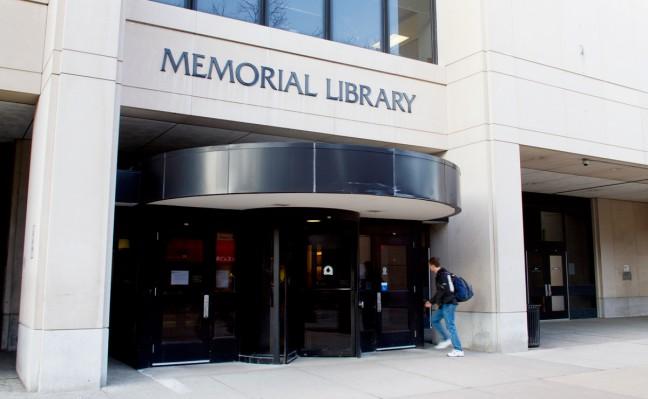In the midst of National Library Week, University of Wisconsin Libraries is working to make updates to facilities and draw more attention to the diverse resources libraries provide.
Natasha Veeser, Memorial Library spokesperson, said libraries serve the community in more ways than people realize. Veeser said UW Libraries is joining a national initiative called the Libraries Transform Campaign to emphasize what libraries do.
“The connections [libraries] are able to make and the vast resources they’re able to pull from is something that a lot of people don’t realize,” Veeser said. “It’s more than just pulling a journal. We can request materials from around the world to help people out in their research.”
Knowledge-hungry? Our collections keep you satisfied. Ramen satisfied! #UWLibrariesTransform https://t.co/ZT0vrc1MrE pic.twitter.com/WGjgsgFtjX
— College Library (@college_library) April 14, 2016
As part of the initiative, UW’s libraries are spreading the word about a library’s versatility by taking to Twitter with pictures inspired from the national campaign using #UWLibrariesTransform.
Veeser said the goal is to help students recognize that UW libraries do more than just provide students with books.
Books sure, but did you know you can check out a GoPro or PS4? #UWLibrariesTransformhttps://t.co/CCUFL20BIe
— WCER (@WCER_UW) April 14, 2016
Because of libraries, UW students can use advanced computer technologies, rent photography and video equipment, engage in professional level research and have convenient places to study, Veeser said.
“Libraries are a very deep sea of resources,” Veeser said.
Books sure, but did you know you can check out a GoPro or PS4? #UWLibrariesTransform https://t.co/QHBLpXw4UC pic.twitter.com/jBfTlYbBQC
— UW-Madison Libraries (@UWMadLibraries) April 13, 2016
To help further the mission of helping libraries better serve the community, Veeser said UW Libraries is also starting a consolidation initiative to repurpose facilities so they can be used more efficiently by students.
Though both initiatives started independently of each other, Veeser said they are part of a two-fold approach to revamp UW libraries. Though consolidation may sound like downsizing, Veeser said no libraries will be closed or shut down.
“I know consolidation has a very negative connotation to it sometimes, [but] it’s really about rethinking the spaces … so if we have one area in particular that’s not heavily trafficked or has books that aren’t heavily used, [we can] move those materials to another location and transform a particular space … to be more beneficials to our users,” Veeser said.
While the effort will save money by making libraries more efficient, Veeser said this idea has been discussed for ages and its conception was not budget related.
One library on campus, Steenbock Library, received significant remodeling to its basement. Though the remodeling wasn’t initially part of the consolidation effort, Veeser said it serves as an example of what UW Libraries is capable of. Another plan is to remodel the graduate workspace in Memorial Library, Veeser said.
Veeser said another goal is to move materials from smaller libraries into larger libraries, to consolidate the materials and make better use of smaller spaces for things like studying. All materials will still be easily accessible to students.
Additionally, libraries will continue to develop technology by making more journals more readily available online and getting more technology equipment available for loan.
Veeser said much of the consolidation effort is still in the early stages of talking with specific libraries to see what will work best for them. She said it’s going to take years to accomplish the consolidation initiative.
“It’s really about collaborating and coordinating with our partners and the rest of campus to really think about how we can best serve … the students, the faculty, the community at large,” Veeser said.


